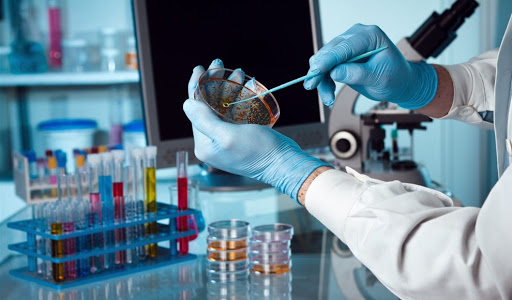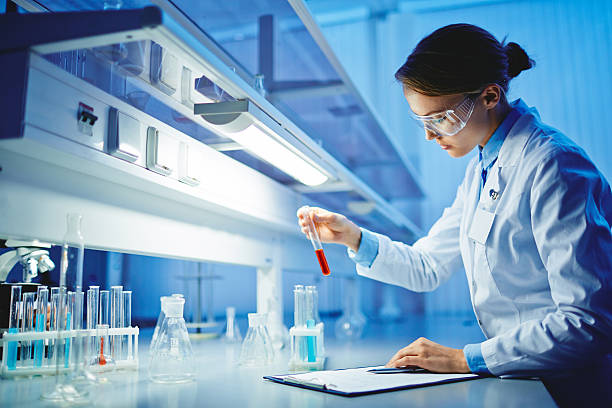For Students
STEM Jobs- 2. Biochemist/ Biophysicist
Admin Aug 23, 2022 03:17 PM

TAGS
If you prefer laboratory-based work and study and are interested in the biological sciences, then a career as a biochemist or biophysicist should be something you really consider. What draws people to biochemistry and biophysics? It surely helps that they're anticipated to expand quickly and offer highly competitive compensation. By 2022, jobs for biochemists and biophysicists are predicted to increase by more than 41%. This means that during the next decade, 7,700 new roles in the industry will become available, giving a diverse range of job prospects for those in the field. Those occupations will also pay well.
Of course, numbers aren't everything. Working in biochemistry and biophysics is particularly appealing because it allows you to discover new things that could have a significant impact on people's lives all around the world. Biochemists and biophysicists do study on the chemical and physical principles of living things, as well as the biological processes that they go through, using cutting-edge technology. This can range from researching the causes of cancer to creating novel treatments for cancer and other life-threatening diseases. While much of what biochemists and biophysicists accomplish is related to medicine, there are several other uses for this type of education. Agriculture, clean energy, and environmental research all rely on biochemists and biophysicists' discoveries and developments, giving those who work in this profession the opportunity to save lives, keep the environment clean, and feed people all over the world.
Education and Training
An undergraduate degree in biochemistry or biophysics, or a related field such as biology, chemistry, physics, or engineering, is frequently the first step toward a career in biochemistry or biophysics. Students should take biology, chemistry, mathematics, physics, and computer science courses throughout their undergraduate career. Courses that emphasize laboratory work, as well as outside internships and experience that require lab work, can help you get into graduate school and get your first job after graduation.
Those wishing to work in this sector are frequently required to complete a master's or doctoral programme, which typically requires an extra two to six years of study. To be admitted into a biochemistry or biophysics post-secondary programme, students must have lab experience, a love for study, and good grades. Most students will choose a speciality to focus their work once they begin graduate school. Toxicology, genetics, and proteomics are some of the most common fields of study.

Skills to Develop
Critical Thinking: A biochemist or biophysicist's ability to think through the best and most logical way to conduct research or solve a problem is a huge plus.
Perseverance: Because not every experiment will succeed and great discoveries in medical laboratories are rare, biophysicists and biochemists must be able to persevere through trial and error without becoming frustrated or giving up.
Analytical Ability: Biochemists and biophysicists must be able to examine and comprehend their research results in order to create a breakthrough.
Mathematical ability: Much of the work biophysicists and biochemists conduct requires a good background in calculus and statistics.
Communication skills: Because most prospective biochemists and biophysicists will work on research teams, give presentations of their work, and produce reports and publications discussing their findings, communication is a vital skill to improve.
Career Advice from the Experts
Internships and lab experience are two elements that might have a significant impact on an aspiring biochemist or biophysicist's job prospects. Internships that entail a certain amount of work in a laboratory setting are frequently linked to the two. There are still solutions available to students who are unable to get internships (a typical occurrence due to the demand for internships greatly outpacing the supply), which can make a resume more appealing to employers. Even if they aren't directly related to the biosciences, the Biochemistry Society in the United States recommends looking for internships, jobs, or volunteer activities. These experiences can nevertheless help you develop a diverse set of transferable talents that you can highlight on your CV. Short-term work in fields such as conservation, science media, and administration can also be beneficial, as these experiences demonstrate that applicants are qualified for biosciences jobs.
Many job possibilities in this profession will necessitate extra education beyond a bachelor's degree. Whether through academic employers or corporate companies, nearly all research employment in the biosciences will require a Ph.D. There are a number of elements that can make an application far more acceptable to companies at this level of study. According to the Biochemistry Society, Ph.D. students should devote a significant amount of time to selecting a specialisation (some are more marketable than others) as well as an academic advisor. Advisors can provide students with crucial links to future work, recommendations, and research support and guidance. Furthermore, academic and industry employers equally value creative and innovative personal research, so students must be able to plan, administer, analyse, and disseminate their findings.
Search
Latest Blogs

Exploring Opportunities in Emerging Engineering field
Admin
Dec 14, 2024 05:18 PM

Navigating College Majors
Admin
Sep 25, 2024 04:04 PM

Tools for Measuring Strengths For Career
Admin
Sep 25, 2024 03:27 PM
Interested in getting latest updates?
SUBSCRIBE


















